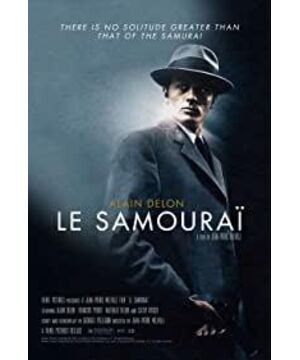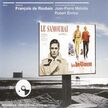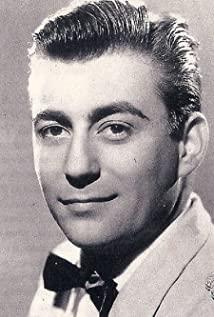"Samurai can endure the most unbearable loneliness in the world, perhaps only the tiger in the forest can compare with it", but everyone is tired, right?
Seven score: 8.17
Synopsis
Jeff (Alan Delon) is a lonely killer. He lives in a remote house with only a bird as his company.
On this day, he received a task: assassinate the boss of a certain club.
He planned carefully, drove a car with a license plate, produced an alibi, and successfully completed the task.
But after a hundred secrets, Jeff was bumped into by the club's pianist (Kathy Rozier) before he left.
After the murder, the police quickly enlisted a bunch of suspects for investigation one by one, and Jeff was also listed.
Surprisingly, when the police arranged to identify Jeff, the pianist actually shielded him.
Jeff was lucky enough to escape, but what he didn't know was that the danger was coming quietly.
When the balance was settled, the middleman shot him.
It turned out that the client was afraid that he would confess to them at the police, and decided to kill him.
Jeff is alive and well, but with a shot in his hand, he decides to find his client to avenge him.
The pianist's protection against him also made him suspicious. He thought the pianist might be related to the client.
He found a pianist, hoping she could tell the story behind the scenes.
The pianist told him to go back first, and asked Jeff to call her two hours later, when she would tell the truth.
When Jeff got home, he found a strange man in the house.
The man was sent by the client, and he gave Jeff a wad of money, hoping to clear up the previous suspicion.
And arranged for him a new task: assassination of the pianist.
On the other hand, the police found no suspicious person after investigation, and Jeff became a key suspect again.
Faced with such a situation, how would Jeff choose...
Film Analysis
This is a film with distinctive features. It has a cold style of painting and very few lines. It is as cold and taciturn as the protagonist Jeff. The film uses a lot of shots and details to promote the plot and show the psychological activities of the characters. The sense of suspense comes from the audience's heart. You will keep asking yourself, what do the characters do? Why do you do this? Even so, the development of the film's plot is still very clear, the logical lines of the characters are also very clear, and the viewing process is quiet and smooth.
The film sets the tone from the long shot of Jeff lying in bed smoking a cigarette. He is lonely. A profession like a killer is destined to be unaccompanied by people, so there is only one bird in his house; in France, a country that is famous for romance, he can’t strike up a conversation when he sees a beautiful woman parked in a car, because every time he shows up, he It would be even more dangerous; after being shot and wounded, he could only bandage himself, and only bear the pain alone. He silently fed the birds, lay on the bed, and once again lit the cigarette that represented loneliness. Because "Samurai can endure the most unbearable loneliness in the world."
The killer is not a murderer, Jeff knows this well, he is rational. After being shot, Jeff quickly understood the reason why the pianist was covering him. There was no naive love at first sight, and some were just benefits. Jeff found the pianist, hoping to get the client’s whereabouts from her mouth, but from beginning to end, Jeff never did anything to harm the pianist, or even threatened her. After all, no matter what, I really want to It was the client who killed him, not to mention the pianist's confession that saved him from imprisonment. A true samurai fights only for his prey, not bullying.
The killer is also tired. Jeff has a close-up of his facial expression after getting rid of the police, obviously he is tired. The world seems calm and calm but there is a hidden murderous intent. Everyone who seems harmless around you may have a picture of you. The old lady in the subway station and the young girl are hard to guard against. Can you hide for a lifetime? Unlikely.
The killer also has feelings. Jeff never wants someone to be hurt because of himself. He is affectionate. When Jeff returned home for the last time, he found his bird was injured. I think this was the starting point for his final decision. After that, he came to a friend's house and keenly sensed his friend's contribution, "Everyone has their own way of life, but they can't influence others." This is what the police said to his friend, and why didn't Jeff understand it?
In the end, he hugged his friend and arrived at the club. He didn't have the number plate for the hat, and deliberately put on white gloves in front of the waiter. The logical line of all this is very clear. We can know Jeff's mental activities without a line. He said in front of those playing cards, "I won't lose." The only way to make a samurai down is to self-destruct. He didn't lose because everything developed according to his plan. Do things, and then choose "not to interfere with other people's lives."
Although after watching the movie, I feel a little bit disheartened and a little sad, but I have to admit that this ending is the best. Everyone has the right to choose their own life, and since they choose, they have to bear the consequences for it, perhaps at all. No one can bear the most unbearable loneliness in this world.
Everyone has the right to choose their own life, but the premise is not to influence or interfere with others' lives.
View more about Le Samouraï reviews









